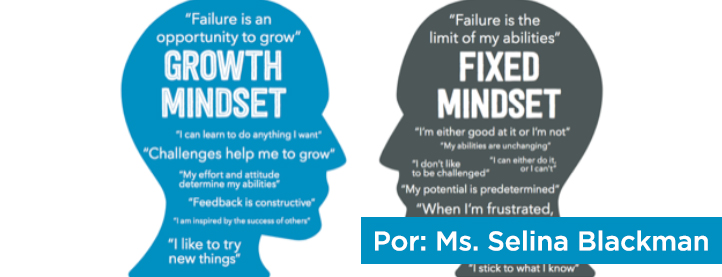ARTÍCULOS DE INTERÉS
Growth Mindset.
Fecha de Publicación: 9/21/2018
Research shows that what we think about our own intelligence is altogether different from individual to individual. Some of us think we are born with a fixed intelligence and our capacities are unchangeable. In other words, we have a certain amount of intelligence, and you can't do much to transform it. This is known as a "fixed mentality." Think about the expression, “I’m just not cut out for algebra.” This announcement demonstrates a fixed mindset about the subject, since it expresses that the capacity to be great in algebra can't be changed.
Others believe that it is possible to grow your intelligence through effort. This is known as a "growth mindset." Think about the expression, "Algebra was extremely hard at first, however I've worked hard all year and I understand it better at this point." This demonstrates a “growth mindset”, since it demonstrates an ability to learn.
If parents want to give their children a gift, the best thing they can do is to teach their children to love challenges, be intrigued by mistakes, enjoy effort, and keep on learning. That way, their children don’t have to be slaves of praise. They will have a lifelong way to build and repair their own confidence.”
- Carol S. Dweck
Whether we have a fixed or a growth mindset it will impact our motivation a lot. If our children think their intelligence is fixed, they’ll very likely believe that success is linked to talent and that some are born with the capacity to succeed, and others simply aren't. Successful people will seem to have an unachievable, born gift. The side effect of the fixed mindset is a powerless or indifferent attitude when it comes to making an effort, especially when it comes to tasks that are demanding and challenging.
The simple conviction that intelligence can be developed, can better prepare our kids for difficult tasks and things that seem too hard. If they realize that they can develop and build up their abilities, that effort and dedication make a difference in the formula for success, children will not turn away from a challenge. The growth mindset helps create a love of learning and a resilience that is essential for achieving goals.
As parents we powerfully affect our children's way of thinking. What we say and what we do show our kids what we expect. Giving praise for the process of learning, accepting mistakes as learning opportunities, and understanding the role of emotions in learning are all things we can start with today.
The way in which we compliment our children can have a deep impact on their mindset. Research on praise and mindsets tells us that when we praise kids for being smart, it promotes a fixed mindset. It makes them think that what they achieve is based on fixed talents they were born with. It would be better to praise our children for working hard and developing skills. Like this we achieve a growth mindset. We can also teach a growth mindset by talking to our children about our own past mistakes, and what we’ve learned from them. Talking in a positive way about our errors and struggles will show our children that making mistakes is a natural part of the learning process.
- Ms. Selina Blackman
Academic Director

